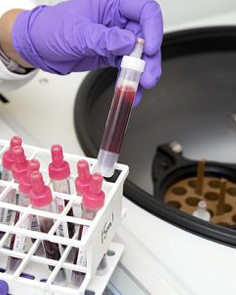World-first trial to transfuse lab-grown red blood cells is underway in Cambridge
Red blood cells that have been grown in a laboratory have now been transfused into another person at the NIHR Cambridge Clinical Research Facility in a world first clinical trial.
The manufactured blood cells were grown from stem cells from donors. The red cells were then transfused into volunteers in the RESTORE randomised controlled clinical trial.
This is the first time in the world that red blood cells that have been grown in a laboratory have been given to another person as part of a trial into blood transfusion.
If proved safe and effective, manufactured blood cells could in time revolutionise treatments for people with blood disorders such as sickle cell and rare blood types. It can be difficult to find enough well-matched donated blood for some people with these disorders.
The RESTORE trial is a joint research initiative by NHS Blood and Transplant and the University of Bristol, working with the University of Cambridge, Guy’s and St Thomas’ NHS Foundation Trust, NIHR Cambridge Clinical Research Facility, and Cambridge University Hospitals NHS Foundation Trust. It is part-funded by a NIHRH grant and supported by NIHR Cambridge BRC.
The trial is studying the lifespan of the lab grown cells compared with infusions of standard red blood cells from the same donor. The lab-grown blood cells are all fresh, so the trial team expect them to perform better than a similar transfusion of standard donated red cells, which contains cells of varying ages.
Additionally, if manufactured cells last longer in the body, patients who regularly need blood may not need transfusions as often. That would reduce iron overload from frequent blood transfusions, which can lead to serious complications.
The trial is the first step towards making lab grown red blood cells available as a future clinical product. For the foreseeable future, manufactured cells could only be used for a very small number of patients with very complex transfusions needs. NHSBT continues to rely on the generosity of donors.
Two people have so far been transfused with the lab grown red cells in Cambridge. They were closely monitored and no untoward side effects were reported. They are well and healthy. The identities of participants infused so far are not currently being released, to help keep the trial ‘blinded’.
The amount of lab grown cells being infused varies but is around 5-10mls – about one to two teaspoons.
Donors were recruited from NHSBT’s blood donor base. They donated blood to the trial and stem cells were separated out from their blood. These stem cells were then grown to produce red blood cells in a laboratory at NHS Blood and Transplant’s Advanced Therapies Unit in Bristol. The recipients of the blood were recruited from healthy members of the NIHR BioResource.
A minimum of 10 participants will receive two mini transfusions at least four months apart, one of standard donated red cells and one of lab grown red cells, to find out if the young red blood cells made in the laboratory last longer than cells made in the body.
Further trials are needed before clinical use, but this research marks a significant step in using lab grown red blood cells to improve treatment for patients with rare blood types or people with complex transfusion needs.

Chief Investigator Professor Cedric Ghevaert, Professor in Transfusion Medicine and Consultant Haematologist the University of Cambridge and NHS Blood and Transplant, pictured right, said: “We hope our lab grown red blood cells will last longer than those that come from blood donors. If our trial, the first such in the world, is successful, it will mean that patients who currently require regular long-term blood transfusions will need fewer transfusions in future, helping transform their care.”
Co-Chief Investigator Dr Rebecca Cardigan, Head of Component Development NHS Blood and Transplant and Affiliated Lecturer at the University of Cambridge said: “It’s really fantastic that we are now able to grow enough red cells to medical grade to allow this trial to commence, we are really looking forward to seeing the results and whether they perform better than standard red cells.”



